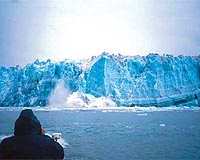| . |  |
. |
Southampton, UK (SPX) Aug 21, 2009 The warming of an Arctic current over the last 30 years has triggered the release of methane, a potent greenhouse gas, from methane hydrate stored in the sediment beneath the seabed. Scientists at the National Oceanography Centre Southampton working in collaboration with researchers from the University of Birmingham, Royal Holloway London and IFM-Geomar in Germany have found that more than 250 plumes of bubbles of methane gas are rising from the seabed of the West Spitsbergen continental margin in the Arctic, in a depth range of 150 to 400 metres. Methane released from gas hydrate in submarine sediments has been identified in the past as an agent of climate change. The likelihood of methane being released in this way has been widely predicted. The data were collected from the royal research ship RRS James Clark Ross, as part of the Natural Environment Research Council's International Polar Year Initiative. The bubble plumes were detected using sonar and then sampled with a water-bottle sampling system over a range of depths. The results indicate that the warming of the northward-flowing West Spitsbergen current by 1 degrees over the last thirty years has caused the release of methane by breaking down methane hydrate in the sediment beneath the seabed. Professor Tim Minshull, Head of the University of Southampton's School of Ocean and Earth Science based at that the National Oceanography Centre, says: "Our survey was designed to work out how much methane might be released by future ocean warming; we did not expect to discover such strong evidence that this process has already started." Methane hydrate is an ice-like substance composed of water and methane which is stable in conditions of high pressure and low temperature. At present, methane hydrate is stable at water depths greater than 400 metres in the ocean off Spitsbergen. However, thirty years ago it was stable at water depths as shallow as 360 metres. This is the first time that such behaviour in response to climate change has been observed in the modern period. While most of the methane currently released from the seabed is dissolved in the seawater before it reaches the atmosphere, methane seeps are episodic and unpredictable and periods of more vigorous outflow of methane into the atmosphere are possible. Furthermore, methane dissolved in the seawater contributes to ocean acididfication. Graham Westbrook Professor of Geophysics at the University of Birmingham, warns: "If this process becomes widespread along Arctic continental margins, tens of megatonnes of methane per year - equivalent to 5-10% of the total amount released globally by natural sources, could be released into the ocean." The team is carrying out further investigations of the plumes; in particular they are keen to observe the behaviour of these gas seeps over time.
Share This Article With Planet Earth
Related Links National Oceanography Centre, Southampton Water News - Science, Technology and Politics
 Increased Ocean Acidification In Alaska Waters
Increased Ocean Acidification In Alaska WatersFairbanks AL (SPX) Aug 17, 2009 The same things that make Alaska's marine waters among the most productive in the world may also make them the most vulnerable to ocean acidification. According to new findings by a University of Alaska Fairbanks scientist, Alaska's oceans are becoming increasingly acidic, which could damage Alaska's king crab and salmon fisheries. This spring, chemical oceanographer Jeremy Mathis returned ... read more |
|
| The content herein, unless otherwise known to be public domain, are Copyright 1995-2009 - SpaceDaily. AFP and UPI Wire Stories are copyright Agence France-Presse and United Press International. ESA Portal Reports are copyright European Space Agency. All NASA sourced material is public domain. Additional copyrights may apply in whole or part to other bona fide parties. Advertising does not imply endorsement,agreement or approval of any opinions, statements or information provided by SpaceDaily on any Web page published or hosted by SpaceDaily. Privacy Statement |